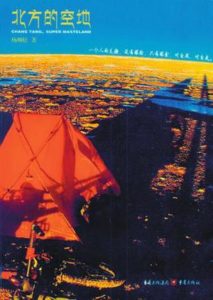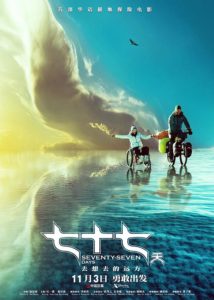Seventy-Seven Days
七十七天
China, 2017, colour, 2.35:1, 113 mins.
Director: Zhao Hantang 赵汉唐.
Rating: 7/10.
Desert-trek drama sustains itself with superb photography and two absorbing performances.
Jieshan Daban, western Tibet province, China, 20 Apr 2010. After hiking for 80 days across the 1,400 kilometres from Shanghai, solo traveller Yang Liusong (Zhao Hantang) has finally arrived at the start of the challenge he’s been preparing for two years – being the first person to cross the uninhabited zone of Qiang Tang from east to west, alone on a bike without any back-up. It’s taken him 20 days just to get to this point from Lhasa, where he had consulted the only specialist on the region, Old Captain (Luosang Qunpei), a Tibetan who surveyed it in the 1960s and thought Yang Liusong was mad to undertake such a journey on his own. There he had also met a neighbour of Old Captain, the wheelchair-bound photographer Lan Tian (Jiang Yiyan) who ran a small inn on her own. She had ended up giving him a lift to near his starting point, as she was driving to Mount Kailash to fulfil one of her dreams, to see Mt. Everest. En route the two had become very close, and his memories of her sustain him throughout the journey. Leaving the highway, Yang Liusong sets off into the Qiang Tang, encountering a dust storm, an angry yak and a relic of Old Captain’s survey expedition. On the 27th day he starts to feel ill, and is threatened by two wolves who prowl outside his tent. Using a special whistle given him by Lan Tian, he manages to escape, but the two wolves follow him from a distance. On the 38th day he reaches the edge of a desert plateau and starts running out of water. Crossing a vast saltwater flat, he is still followed by the wolves. Reduced to drinking his own urine, he’s eventually saved by an overnight snowfall. On the 55th day he’s trapped by a flash flood and later followed by a wolf cub he’s rescued. Then, on the 65th day, as his food supply runs low, a tornado strikes, destroying everything.
REVIEW
Calling itself, with some justification, “the first Chinese-language extreme adventure film”, Seventy-Seven Days 七十七天 combines often stunning photography – courtesy Taiwan ace Li Pingbin 李屏宾 [Mark Lee] – with two well-matched lead performances to largely successful results. Based on a 2011 book (see left) by Yang Liusong 杨柳松 (Chang Tang,  Super Wasteland 北方的空地), which records his real-life trek, it marks a strong directing debut by Zhao Hantang 赵汉唐, aka Zhao Yi 赵毅, 46, a Sichuan-born actor who’s better known for TV than his occasional film roles (Purgatory in the Sunlight 炼狱里的阳光, 2008; Langmusi My Dreamland 云中的郎木寺, 2012). Three years in the making, largely shot in the actual high-altitude locations in Tibet province, and with a convincing dramatic arc that doesn’t rely on the usual ethnic exoticism, it’s an absorbing portrait of human and spiritual endurance, often with a refreshingly light touch. Considering its specialist appeal, the film has performed creditably on release, taking RMB85 million.
Super Wasteland 北方的空地), which records his real-life trek, it marks a strong directing debut by Zhao Hantang 赵汉唐, aka Zhao Yi 赵毅, 46, a Sichuan-born actor who’s better known for TV than his occasional film roles (Purgatory in the Sunlight 炼狱里的阳光, 2008; Langmusi My Dreamland 云中的郎木寺, 2012). Three years in the making, largely shot in the actual high-altitude locations in Tibet province, and with a convincing dramatic arc that doesn’t rely on the usual ethnic exoticism, it’s an absorbing portrait of human and spiritual endurance, often with a refreshingly light touch. Considering its specialist appeal, the film has performed creditably on release, taking RMB85 million.
More a spiritual odyssey than a survival movie – the main character chooses to make the journey – it starts with Yang Liusong about to leave the beaten track and set off into the uninhabited region of Qiang Tang 羌塘 with just a bike, tent and basic provisions. With no scenes sketching his life back in Shanghai, the only reason given is that he wants to “feel alive”, to challenge himself by becoming the first person to cross the region from east to west. With no human encounters to power the odyssey – unlike, say, in two-wheel odyssey Kora 转山 (2011) – the film is sustained by flashbacks to his preparatory spell in Lhasa, where he consulted a local specialist as well as meeting a wheelchair-bound photographer who pluckily ran a small inn there. As the latter gives him a lift to near his starting point, their initially edgy relationship deepens to a point where both he and she discover common ground, giving each a reason to look forward to their reunion.
Though he doesn’t look like the real-life Yang Liusong, Zhao is fine, bringing a sly humour to the role as he’s first threatened by two wolves who just won’t go away (scenes that are both scary and funny) and later is joined by a cute wolf cub he rescues en route. As the physical challenges mount – thirst, shortage of food, endless empty landscapes – memories of his days with the young cripple carve a parallel story that progressively enriches the physical trek.
On the acting side an equal pleasure is Jiang Yiyan 江一燕 (One Summer with You 与你同在的夏天, 2004; Deadly Delicious 双食记, 2008; The Four II 四大名捕II, 2013; The Vanished Murderer 消失的凶手, 2015) as the young cripple, a role that didn’t exist in original drafts but has been developed into an integral part of the movie, as well as incorporating Jiang’s real-life interest in photography. The now 34-year-old actress brings some of the same steel she showed in I Phone You 爱封了 (2011), studiously avoiding any handicapped soppiness. Her passionate outpouring, an hour in, on the realities of her life during the past five years, is one of the film’s dramatic highlights, showing once again she’s one of China’s most undervalued actresses.
Li’s widescreen photography mixes grit and magic – notably in a sequence crossing a vast, horizonless salt flat – that has a convincing you-are-there flavour, and the score by Singapore’s He Guojie 何国杰 eschews ethnic cliches, supplying atmosphere and/or inspiration only when necessary. Visual effects do the job. All in all, a nice surprise on every level.
CREDITS
Presented by Zhejiang Hongshanshu Media (CN), Defeng Pictures (CN), Hantang (Beijing) Film (CN), Great Media Global Entertainment (Beijing) (CN).
Script: Zhao Hanting, Cao Jinling, Gao Zheng, Zhou Houheng. Book: Yang Liusong. Photography: Li Pingbin [Mark Lee]. Unit photography: Liu Chang, Yang Wanli, Wang Lindong. Editing: Huang Zimo. Editing advice: Liao Qingsong. Music: He Guojie. End-title song: Dou Wei. Vocal: Jiang Yiyan. Art direction: Yang Zi [Larry Yang], Lei Lei. Styling: Gao Bin, Deng Duo. Sound: Tang Xiangzhu, Du Duzhi, Wu Shuyao.
Cast: Jiang Yiyan (Lan Tian), Zhao Hantang (Yang Liusong), Luosang Qunpei (Old Captain), Renqing Shengge (border-defence officer), Dawa Sangzhou (photographer), Zhang Huanhuan (reporter), Tong Guoqiang (driver).
Premiere: Canada China Film Festival (Co-Closing Film), Montréal, 27 Sep 2017.
Release: China, 3 Nov 2017.
